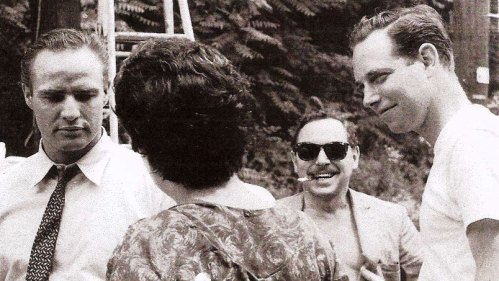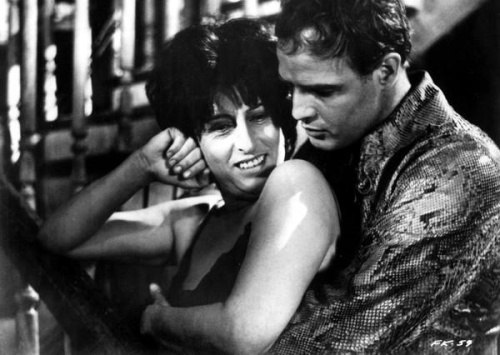The Criterion Collection has just restored and released Sidney Lumet’s strange, ecstatic, uneven, and memorable film The Fugitive Kind, which gave me the chance to interview producer Richard Shepherd about the making of the movie, and I’m pleased to say, the people at Criterion have posted it on their website.
From left to right: Brando, Maureen Stapleton, Tennessee Williams, and our man Richard Shepherd.
It was Jules Stein, head and founder of MCA, who plucked Richard Shepherd out of Stanford and made him into a real New York agent of the fifties, a gentlemen agent, the kind we look back on today with nostalgic reverence. With his handkerchief and tie always in sync, you’d know without knowing that Shepherd, before he was in show business, was ivy-league all the way, a well-groomed journalism major, genteel in taste and manner, and according to his professors, the best art forger the faculty had ever seen. Shepherd could do Chagall like Jonathan Winters did Burt Lancaster—and it got him a little work—until someone told him he had to make a living.
Then it was Jules Stein and MCA. In time, Shepherd amassed a spectacular client roster that included Henry Fonda, Marilyn Monroe, Grace Kelly, and several dozen immaculate others. But the corner office wasn’t enough. Shepherd wanted to produce. He announced his intentions to Lew Wasserman (“Good luck” was his only reply), and moved out to Los Angeles, where he teamed with Martin Jurow, one of the industry’s top entertainment lawyers. Together they formed Jurow-Shepherd Productions and started looking for material. The Hanging Tree (1959), a western with Gary Cooper and Maria Schell, was their first picture. The Fugitive Kind (1959) was their second.
I met Shepherd at his home in Bel-Air on March 22nd, 2010. We had talked many times before, but never about The Fugitive Kind.
Sam Wasson: Marty Jurow, in his book, Marty Jurow Seein’ Stars, says the idea to film Tennessee Williams’s play Orpheus Descending originated with Anna Magnani. Before you and he started Jurow-Shepherd, Magnani was his client at William Morris, and after the success of The Rose Tattoo, she wanted to return to Williams. How do you remember the beginning of The Fugitive Kind?
Richard Shepherd: Marty and I knew the play because we were both from New York and had seen it onstage with Maureen [Stapleton] and Cliff Robertson, who had played the leads. Presumably, Marty’s recollection is correct, but Anna Magnani and I didn’t have a relationship, so I can’t speak to that. Before the film, I didn’t know her at all. What I can tell you is that I brought Joanne Woodward aboard—she was a client of mine—and Marlon and I were good friends. But you know, before Marty and I got started on the project, [producer] Sam Spiegel wanted to do Orpheus Descending.
SW: He wanted Ingrid Bergman.
RS: But Tennessee didn’t want her! That I could never understand. If you had a choice between Anna Magnani—a great actress, but you can’t understand a damn thing she’s saying—and Ingrid Bergman . . . I mean, come on! It’s night and day! But that’s how we got to make The Fugitive Kind, because we would do it with Magnani, and that’s who Tennessee wanted.
SW: The Fugitive Kind was sexually audacious and had a highbrow literary source. In other words, risky. Did Jurow-Shepherd have a reputation for trying difficult material?
RS: We both had backgrounds in New York and were very involved with artists that ended up working in the theater, and many of them, clients that Marty and I looked after, from Monty Clift to Carroll Baker to Marlon were all of that certain type. Kazan, Williams, Arthur Miller, these were the guys then. So no, we never thought of ourselves as going for difficult material, it was just the hand we were dealt, I guess. But we were cognizant of trying to make the stuff accessible.
SW: Is that why you changed the title from Orpheus Descending to The Fugitive Kind?
RS: I think so. I think we thought it was too intellectual. It wasn’t a big hit play anyway, so why not change it? The title Orpheus Descending had little recognition; it wasn’t doing us any favors. So we went with the The Fugitive Kind. That title, I think, came from Meade Roberts, who adapted the screenplay with Tennessee. We were throwing a lot of possibilities around. Some of the others we had were, “Stranger in a Snakeskin Jacket,” “Life’s Companion,” “Burn Down a Woman,” and “Burn a Woman Down.”
SW: Tennessee gets shared credit with Roberts, but how involved was he in the adaptation?
RS: Other than a couple times when Tennessee would come up to the location in Milton [New York], he didn’t seem to have a significant hand in the script. If we wanted changes, or if Sidney wanted changes, we talked to Meade and he did it.
SW: At first, Brando turned down the part of Val Xavier, which had been written specifically for him. What turned him off?
RS: He didn’t admire Magnani as an actress, and he also felt she was . . . Well, I should say, there’s a scene in the movie, the first scene when the two of them are together, when Marlon first goes into her shop. She’s talking to him at the bottom of the stairs, and at one point in the scene, she says to him, “Have you got any references?” and Marlon says, “Yeah, I got ’em right here” and reaches into his snakeskin jacket pocket and takes out this crumpled letter and kind of embarrassingly unfolds it, and just took a really long time in handing it to her. Finally, once he handed it to her, Magnani did the same thing with the letter, but tripled the amount of time it took. She turned it over, smoothed it out, examined it, you know, she was just trying to outdo him! That’s the way she was as an actress. I think that’s part of the reason Brando didn’t want to be with her.
SW: And apparently she was also trying to go to bed with him.
RS: Oh, yeah. Yeah. He wasn’t interested and she was angry. They’d sort of spar, you know? I’ll tell you something else about Magnani: she would take control of everything.
This interview only gets better. To read more – including the story of how Richard Shepherd orchestrated the first-ever million dollar deal for an actor (Brando, naturally) – please visit the Criterion Website.




